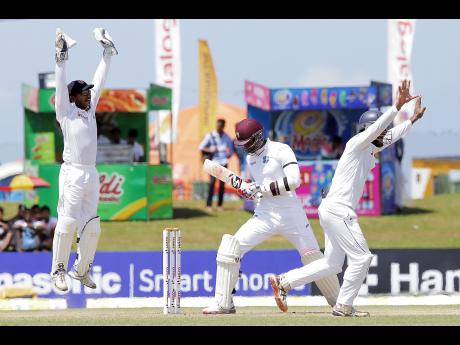West indies cricket comatose
ONE of my colleagues said in a commentary last week that the West Indies Cricket Board is sleeping.
Upon hearing that pronouncement, I contacted him immediately, telling him it was worse.
It is not just that the board is sleeping; West Indies cricket itself is in a coma. This conversation took place even before the regional team bowed and slumped to another predictable and pathetic innings defeat in the first Test match on the current tour of Sri Lanka.
Blaming a sleeping WICB for the continuous deterioration of our cricket is an easy way out, within which lies a covert denial of the actual gravity of the situation.
Many Caribbean fans continue to profess unconditional support for the West Indies team. Again, an attitude buried in a deep-seated denial of the rapid whittling away of the West Indies team and the very institution of West Indies cricket as we once knew it.
The many clichÈd rants about returning to the glory days and turning the corner are basically 'pie in the sky' dreams based on emotionalism, blind loyalty, and patriotism without any semblance of appreciation for the reality.
While the administrators of the regional board provide an easy punching bag for the state of our cricket, my retort to that is that the competence of our administrators is in no way significantly worse today than it was in the 1970s, 80s and 90s.
Better in past days
The marauding dominance of the West Indies team in those glory days was hardly due to any stroke of genius or brilliant structures and systems implemented by the board then, compared to what is happening now.
In fact, I would venture to say that things are better today for the average regional cricketer than they were back in those glory days.
Other social, cultural and cricket dynamics have significantly shifted over the past two decades and have effectively forced West Indies cricket into relative obscurity. Those are not restricted to the ineptitude of successive boards and administrators.
I have long argued that the problems of West Indies cricket are complex and multifaceted and at this point I would like to add unsolvable. West Indies cricket will never return to what it used to be.
The game of cricket has evolved globally, but it has done so at an even faster rate in the West Indies.
The fundamental factor driving the current reality is the shift in the mindset and focus of the young and emerging players in the region.
The advent of the fast, frantic and cash-rich T20 version of the game has rendered the longer versions of the game irrelevant and unattractive to the average young cricketer across the region.
This is quite understandable, since the players stand to make ton loads more money and become bigger and more celebrated stars if they become swashbuckling T20 experts such as Chris Gayle, Kieron Pollard, and Andre Russell, instead of seeking to represent a struggling mockery of a Test team that is merely clinging to the remnants of a triumphant past.
The future of West Indies cricket lies in the T20 format and nowhere else. The West Indies are just as pathetic and shameless in 50-over cricket as they are in Test cricket. The natural athleticism, speed, strength, agility plus typically short attention span makes the Caribbean cricketer the perfect fit for T20.
Only the blind optimists will remain defiant and continue to clutch at the rhetoric-laced emotional straws being offered as a chance of a full West Indies revival.
The hard, cold fact of the matter is that West Indies cricket remains in a serious coma gasping for its last breath, with the life support machine being fuelled by the much-maligned Twenty20 cricket.

